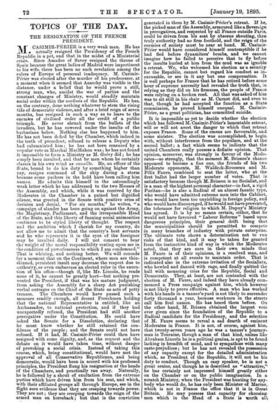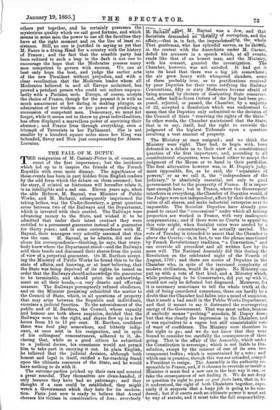TOPICS OF THE DAY
THE RESIGNATION OF THE FRENCH PRESIDENT.
CASIMIR-PERIER is a, very weak man. He has ja_VI • actually resigned the Presidency of the French Republic in a pet, and that in the midst of a Ministerial crisis. Since Amadeo of Savoy resigned the throne of Spain because the great ladies of Madrid were impertinent to his wife, there has been no such revelation among the rulers of Europe of personal inadequacy. M. Casimir- Prier was elected after the murder of his predecessor, at a moment when it seemed that Anarchy was visible in the distance, under a belief that he would prove a still, strong man, who, amidst the war of parties and the constant changes of Ministry, would steadily maintain social order within the confines of the Republic. He has, on the contrary, done nothing whatever to stem the rising tide of democratic violence, and after a brief reign of seven months, has resigned in such a way as to leave to the enemies of civilised order all the credit of a public triumph. He never shrank from the bullets of the invaders, but he has cowered under the insults of the barbarians below. Nothing else has happened to him. He has not been dtfied by the Chamber, which indeed in the teeth of precedent, refused to release a Deputy who had calumniated him ; he has not been censured by a popular vote as Marshal MacMahon was ; he has not found it impossible to foi m a Ministry as M. Grevy did ; he has simply been insulted, and that by men whom he certainly classes in his own mind as canaille. He, an officer of the S:ate, bound to do his duty by something higher than pay, resigns command of the ship during a storm because some packers in the hold have been calling him names. He admits this himself in the astoundingly weak letter which he has addressed to the two Houses of the Assembly, and which, while it was received by the 3Ioderates in the Chamber in a pained but dignified silence, was greeted in the Senate with positive cries of derision and denial. "For six months," he writes, "a campaign of slander has been going on against the Army, the Magistracy, Parliament, and the irresponsible Head of the State, and this liberty of fanning social animosities continues to be styled liberty of thought. The respect and the ambition which I cherish for my country, do not allow me to admit that the country's best servants and he who represents it in the eyes of the foreigner may be insulted daily. I will not consent to bear the weight of the moral responsibility resting upon me in the condition of powerlessness to which I am condemned." That is whining, and nothing better. We will concede for a moment that on the Continent, where men are thin- skinned, persistent insult may decrease the respect due to authority, or even embarrass an elected ruler in the execu- tion of his office—though if, like Mr. Lincoln, he reads none of it, he cannot be greatly hurt—but nothing pre- vented the President, if that was his mature judgment, from asking the Assembly for a sharp Act punishing verbal outrages on the Chief of the State as acts of petty treason. The Chambers would have passed such a measure readily enough, all decent Frenchmen holding that the national Representative is entitled, like an Ambassador, to national protection, and if they had unexpectedly refused, the President had still another prerogative under the Constitution. He could have asked the Senate for a Dissolution, declaring that he must know whether he still retained the con- fidence of the people ; and the Senate could not have refused. If it had, M. Casimir-Prier could then have resigned with some dignity, and, as the request and the debate on it would have taken time, without danger of provoking a social crisis. Instead of taking this course, which, being constitutional, would have met the approval of all Conservative Republicans, and being democratic, would have been in accord with his professed principles, the President flung his resignation at the heads of the Chambers, and practically ran away. Naturally, he is followed by a shout of exultation from the extreme parties which have driven him from his seat, and which, with their affiliated groups all through Europe, see in the flight sure evidence that they are creeping towards power. They are not ; they are creeping towards the reign of the armed man on horseback ; but that is the conviction generated in them by M. Casimir-Perier's retreat. If he, the picked man of the Assembly, armoured like a Sovereign in prerogatives, and respected by all France outside Paris; could be driven from his seat by obscene shouting, then truly authority had no firm foothold, and the reign of the enemies of society must be near at hand. M. Casimir- Prier would have considered himself contemptible if he had fled before dynamiters' bombs, and we cannot imagine how he failed to perceive that to fly before the insults hurled at him from the mud was as ignoble a retreat. We, who welcomed his election as a security for the Republic, cannot but regard his conduct as in- excusable, or see in it any but one compensation. It is well perhaps for France that he has retired before some hour of supreme necessity had revealed the truth that, in relying as they did on his firmness, the people of France were relying on a broken reed. All that was asked of him was to sit still in his chair as M. Carnot did, and even to that, though he had accepted the function as a State commission, he proved himself unequal. M. Casimir- Wrier, as a great politician, has committed suicide.
It is impossible as yet to decide whether the election which has followed M. Casimir-Perier's lamentable retreat, will or will not avert the danger to which that retreat exposes France. Some of the omens are favourable, and some sinister. The election was accomplished, to begin with, without interference from the populace, and at the second ballot ; a fact which seems to indicate that the united Chambers really possess a definite opinion. That opinion, moreover, was strongly in favour of the Mode- rates—so strongly, that the moment M. Brisson's chance appeared to become a fine one, the friends of his two Moderate opponents, M. Waldeak-Rousseau and M. Felix Faure, combined to seat the latter, who at the first ballot had the larger number of votes. That is satisfactory because though M. Brisson is no Socialist, and is a man of the highest personal character—in fact, a rigid Puritan—he is also a Radical of an almost fanatic type, who would have admitted extreme men into the Cabinet, who would have been too unyielding in foreign policy, and who would have discouraged, if he would not have prevented, the tolerance for religion to which M. Dupuy's Ministry has agreed. It is by no means certain, either, that he would not have favoured "Labour Reforms" based upon dangerous principles, their general drift being that the municipalities should be permitted to compete in many branches of industry with private enterprise. The ultimate vote shows a determination not to run risks of that kind, and it may be taken for granted from the instinctive kind of way in which the Moderates acted, that they are sure in their own minds that M. Faure is of their opinions, is a resolved man, and is competent at all events to maintain order. That is indicated also in the extreme irritation of the Socialists, who howled and danced with rage, and finally quitted the hall with menacing cries for the Republic, Social and Democratic. They, at least, are not contented with the election of M. Faure, and indeed they have already com- menced a Press campaign against him, which however is not likely to prove effective. A man who has worked with his hands in a tanner's-yard is not likely to surrender forty thousand a year, because workmen in the streets call him foul names. He has heard them before. Oa the other hand, M. Brisson obtained the largest vote ever given since the foundation of the Republic to a Radical candidate for the Presidency, and the selection of M. Faure seems to reveal a sad dearth of eminent Moderates in France. It is not, of course, against him, that twenty-seven years ago he was a tanner's journey- man in Touraine, though a man of that kind, unless like Abraham Lincoln he is a political genius, is apt to be found lacking in breadth of mind, and to sympathise with many caste-prejudices ; but he has not revealed the possession of any capacity except for the detailed administration which, as President of the Republic, it will not be his duty to conduct. Though an easy speaker, he is not a great orator, and though he is described as "attractive,' he has certainly not impressed himself greatly either on the Chamber or on the public imagination. In a scratch Ministry, when the President was hunting for any-. body who would do, he has only been Minister of Marine,. which is not in France the office that it is in Great, Britain. He may possess that capacity for choosing, men which in the Head of a State is worth all, others put together, and he certainly possesses the mysterious quality which we call good fortune, and which means in some men the power to use all the faculties they have at the right moment and on the line of least re- sistance. Still, no one is justified in saying as yet that M. Faure is a fitting Head for a country with the history of France ; and the fact that the sensible party has been reduced to such a leap in the dark is not one to encourage the hope that the Moderates possess many men competent to govern with success. We can at best only hope the best, and judge the earlier acts of the new President without prejudice, and with a clear recollection that the Moderate leader whom all Moderates believed in and all Europe acclaimed, has proved a petulant person who could not endure unpopu- larity with a Parisian mob. Europe, of course, accepts the choice of France, though for the present it is with as much amazement at her daring in making plunges, as admiration of her wisdom or her power of producing a succession of competent men. Democracy, we must not forget, while it seems not to throw up great individualities, has often displayed a marvellous power of surviving their absence ; and France lives through everything, even a triumph of Terrorists in her Parliament. She is not smaller by a hundred square miles since her King was beheaded, Savoy and Nice just compensating for Alsace- Lorraine.



































 Previous page
Previous page